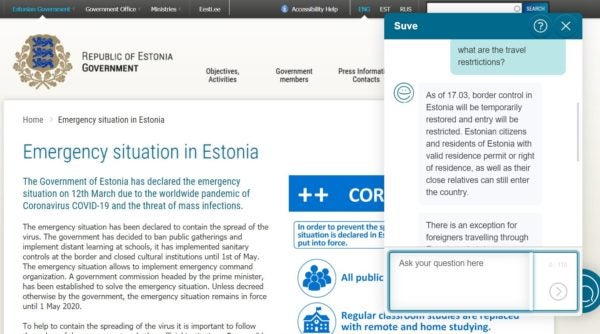A state-backed chatbot is providing coronavirus information across Estonian government websites to help keep the public informed during the crisis.
The coronavirus chatbot, dubbed Suve, answers questions about pandemic such as “what are the travel restrictions” or “can I test for coronavirus”.
Suve then gives a short answer and provides links to government sources with more relevant information.
The software appears on the websites for the Government of Estonia; Estonia’s Health Board; Ministry of Social Affairs; Work in Estonia; International House of Estonia and Invest in Estonia.
There are also plans to roll it out on more websites. It is hoped that using Suve will help keep phone lines free and counter the spread of Covid-19 misinformation.

Suve is currently available on a number of Estonian websites.
National digital advisor of the Government Office of Estonia Marten Kaevats said: “The chatbot offers us a new additional possibility to receive information about changes and at the same time alleviate the pressure on information hotlines.
“Today, Suve, the chatbot can be compared to a puppy who does not know all the tricks yet and does not know all the answers but tens of volunteers are working towards making her smarter and more skillful.”
Coronavirus chatbot rolled out in ten days
Suve was created at a ‘Hack the Crisis’ hackathon, which was set up on the 14 March by Garage48 and Accelerate Estonia to find ways to provide technological assistance during the coronavirus pandemic. Similar events have taken place in Germany, Finland, Poland, Lithuania, Portugal and Latvia.
Suve’s creators, eeBot, are working with the Estonian government’s Communication Unit and launched the chatbot in just ten days.
“There´s no need to call your family doctor or information hotline to ask whether it is currently possible to travel to Finland or ask about sick leaves,” said Michaela Snopková, head of the eeBot team and one of the founders.
“Suve gives answers to these kind of questions. This way doctors are reachable to the people who have the coronavirus symptoms or suffer other medical conditions and therefore need a quick and personal counselling.”
Estonia has established a reputation as a country that embraces digital technology thanks to its e-Estonia and e-residency initiatives. The European country is no stranger to a chatbots, with a public service virtual assistant currently in development. The aim is for people to access public services and information via a conversation with an AI voice-assistant, as well as use it to carry out tasks such as submitting government forms.
The Estonian government declared an emergency situation on 12 March because of the coronavirus pandemic and closed its borders on 17 March.
Popular messaging service WhatsApp has also launched a chatbot in collaboration with the World Health Organization to provide accurate information to its two billion users.












